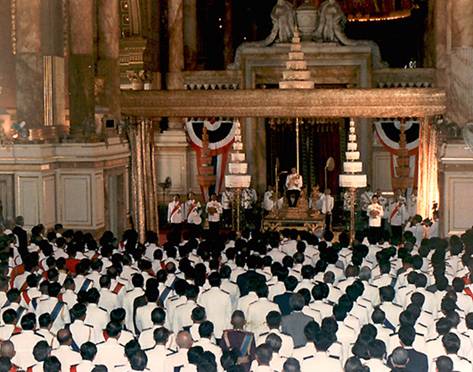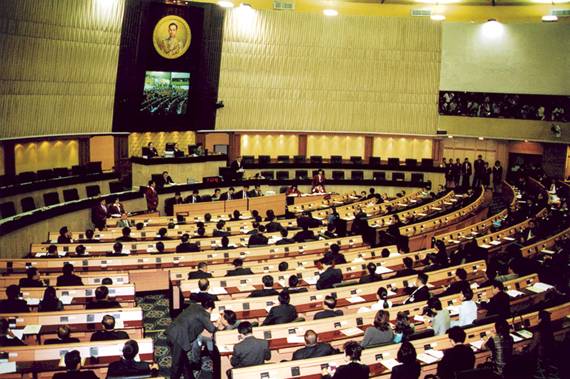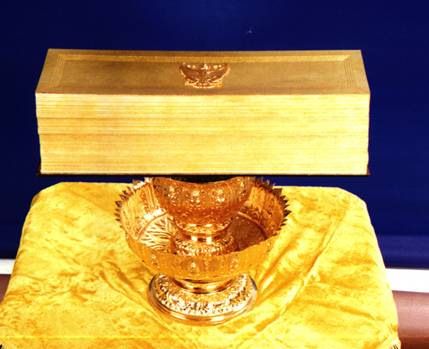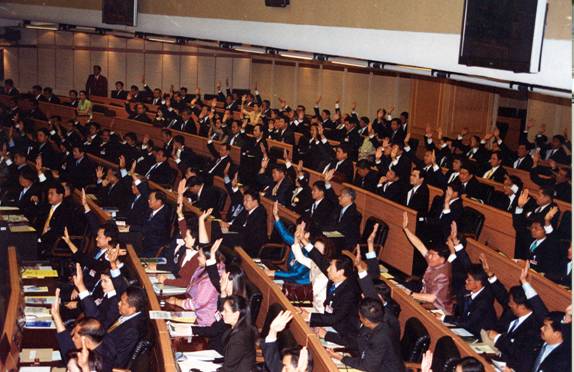The State Ceremony for the Opening of the National Assembly
A state ceremony is a ceremony nominated by the Government to the King asking for His Majesty’s acceptance under His patronage and His Majesty’s kindness to preside over the ceremony or to appoint any person to perform on His behalf. During the ceremony, His Majesty also grants audience to a group of people.
The state ceremony to open the National Assembly covers the House of Representatives, Senate, Constituent Assembly and National Legislative Assembly, or other names as appeared in each constitution. It shows that the State carries out the ceremony while His Majesty the King is presiding over the ceremony or may command the Heir to the Throne or any person to perform the ceremony as His Representative to grant audience to the Thai people’s representatives and give speeches before performing their duties in office.
It was presumed that the King had to make his presence at the ceremony according to a long-standing common practice, which is similar to that of England, which was considered a model for the countries which adopts a democratic regime of government with a constitutional monarchy.
The most significant part of the ceremony is His Majesty the King’s speeches given to the Members of the National Assembly. The Royal speeches reflect His genuine concerns making the Members heartily treat His Majesty’s speeches as Royal instructions being an ultimate guideline to perform their duties.
The state ceremony for the opening of the National Assembly is performed at Ananta Samakom Throne Hall. Upon His Majesty’s arrival by a car at the West elevated platform facing Amporn Satarn Throne Hall, His Majesty would walk through the rear throne hall and sit on Bhuttan Kanjana Singhasna Throne under the nine-level canopy behind the curtain while whose who receive the audience stay before the curtain. By the time His Majesty has settled down on the Throne, the Royal Page beats the wooden Thai castanets rapidly and repeatedly (to give signal), the curtain personnel winds open the curtain, the guard of honour pays the salute and the brass-band plays the Royal Anthem. When the music fades out, His Majesty the King gives the speech to open the National Assembly session. After the speech, the Royal Page gives signal with the castanets, the curtain personnel winds the curtain to close, the Royal Anthem sounds and His Majesty walks out of the audience hall. This concludes that state ceremony for the opening of the National Assembly session with the full honour according to the Royal Thai tradition.
The House of Representatives
“The House of Representatives” is composed of a “House” and “Representatives”
A “House” is a meeting, organization or place for a meeting. While “Representatives” mean persons who are elected by the people as their representatives in the legislative assembly. When both words are put together, it is called the House of Representatives meaning an institute or place for a meeting of the elected-people to perform their duties on the legislative branch.
The House of Representatives was first established in accordance with Siamese Administration Constitution Act (Interim) B.E. 2475 (1932) “having authorities to issue Acts…” and “…to oversee national affairs and call for a meeting to withdraw any members of civil committees or government officers…”
The intention of transforming the country’s administration of “Khana Rasadorn” was at first to establish the House of Representatives as a political institute with a supreme power in order to exercise such a power as a tool to reengineer an administration of the country. On 28 June B.E 2475 (1932), 70 interim Members of the House of Representatives were appointed by a group of military responsible for protecting the capital area and the first House sitting was held in the same day at 2.00 p.m.at Ananta Samakom Throne Hall.
Under drafting the Constitution of the Kingdom of Siam in place of the previous one with the purpose of interim enforcement, the constitution drafting subcommittee remains the same opinion and principle of it – that is to set up the House of Representatives as a powerful political body to be people’s representatives. While the consideration was carrying out, some members proposed that the name of the organization should be changed into the “Assembly of Representatives” with a reason that there is a new political organization in charge of governing the administration branch called “Council of Ministers”. If the “House of Representatives” is therefore used, it may make people confused that Siam is a bicameral system.
From this issue, there are two different opinions that are agreement and disagreement. The agreement side said if the “Assembly of Representatives” is used, it will match with an “Assembly” in English word a Ministry of Foreign Affairs translated from. The other side said the word “House of Representatives” is quite understood and familiar to the people. If this name is changed, people may get misunderstanding that it is a new institute. As a result, the “House of Representatives” should further be used. To stop making a mistake, it is concluded that the “Council of Ministers”, an administrative organization should be changed into another name to be more appropriate.
Finally, the one who proposed such an idea withdraws their proposal so the name of the “House of Representatives” has still be called onwards. In addition, the meeting considered the Thai words of the “Council of Ministers”. Even though the Thai word was changed, the word in English is still the same – that is the “Council of Ministers” which still be called up until now.
“Prued Sapha” (The Senate)
On 24 June 1932, Thailand has been transformed the administration of regime. As a result, a unicameral – only the House of Representatives – was prescribed in the Constitution. When the Constitution of the Kingdom of Thailand B.E. 2489 (1946) was later promulgated, the House was changed into the bicameral system, comprising “Prued Sapha” (The Senate) and the House of Representatives which was the 6 th National Assembly of Thailand.
From B.E. 2489 (1946) to B.E. 2490 (1947), the Senate was composed of 80 members with 6 years term. However, after taking the office for 3 years, half would be drawn to leave office. The qualifications of senators are as follows: being not less than 40 years of age or having graduated with not lower than a bachelor’s degree or its equivalent for a period of not less than 5 years, having served as government officials in the position of not lower than director of department or its equivalent but not being permanent officials. The Senate has power and duties in withholding the bills passed the consideration of the House of Representatives and controlling the administration of the state affairs of the Council of Ministers.
Under the Constitution of the Kingdom of Thailand B.E. 2489 (1946), it is provided that Senator shall be elected by the people. During the first period, however, it was provided that such members obtained from the previous election shall proceed their election before so the election was set up on 24 May, B.E. 2489 (1946). The Office of the Secretariat of the Senate is located at Apisek Dusit Throne Hall and the sitting of the Senate was held there. The first session of the Senate was on 3 June B.E. 2489 (1946) with an elected-president, Mr. Wilas Osathanon.
On 8 Novermber, B.E. 2490 (1947), such constitution was abolished causing from a coup d’ etat led by Lieutenant Colonel Phin Choonhavan. The new constitution called the Constitution of the Kingdom of Thailand (Interim) B.E. 2490 (1947) was promulgated and the word “Prued Sapha” was then changed to “Wuthi Sapha” and used at that time up until now.
(**Remarks : Though “Prued Sapha” and “Wuthi Sapha” are different words in Thai, both have the same meaning in English.)
Constitution
After changing absolute monarchy into democratic regime in 1922, Thailand had supreme law named “The Temporary Charter for Administration of Siam Act, B.E. 2475”. The word “Constitution” was initially used when Thailand had the second Constitution which was called “Constitution of the Kingdom of Siam, B.E. 2475”. Major General Phra Chao Worawong Ther Kromamuen Narathip Pongprapan coined the term “Constitution” in the Thai Language as “Rath-tha-tham-ma-noon (รัฐธรรมนูญ ) ”. He explained that this term was composed of “Rath” (State) and “tham-ma-noon” (Charter), which in overall meant authority to govern the State. The word “Rath” implied governing and the word “tham-ma-noon” implied authority. Or in another sense, “Rath” meant territory, country or people gathering in certain boundary with sovereignty. Additionally, “tham-ma-noon” meant law of order. Therefore, the word “Constitution” means law on State order.
“Constitution” was also described in Dictionary of Institute of Royal Fellowship, B.E. 2542 as supreme law to make State governing in order by setting up form and regime of the State. This included institutions and organizations having sovereignty in State governing.
Quorum
A quorum is a minimum number of members who attend the parliamentary sitting and the meeting of the House committee provided in the constitution in light of the legislative achievement. When the number of members attending the meeting is not required the minimum number prescribed, it is called not a required quorum. If so, the meeting cannot be implemented though it has been carrying out, it shall be void.
Normally, when it is time for a sitting but the number of members is not required to constitute a quorum, the president is not able to open the sitting. During the sitting, in addition, when any member protests the quorum of the sitting it is not a required quorum, the President of the sitting may have an order to investigate the quorum. If so, the sitting cannot be carrying out. On the other hand, if it is a required quorum, the sitting can further be implementing.
Whip
A whip is a Member of the House of Representatives controls the vote of other members in their party in the sitting under the party’s resolution. A whip also coordinates with other parties to carry out the parliamentary performance smoothly.
Theoretically, members have their own freedom to express their opinion or vote by themselves which may not be in line with the party’s resolution. Practically, on the other hand, the party’s resolution shall be regarded as obedience for all members in the party. Any action which violates party’s resolution is regarded as an offence. When this incident takes place among party’s members, a whip shall report to the executive committee to consider such a wrong-doing.
Neither a “whip” is a Thai word nor English used as an official language. A “whip” in English means “a piece of leather or rope which is fastened to a stick, used for hitting animals or people.” as if it means a controller. As a result, it is not prescribed in the Constitution or rules of parliamentary proceedings.
Stenography
A stenography was first used in a Ministry of Justice under the reign of King Rama V as stenographers were needed for writing testimony used in the court. Morm Chao Sithiporn Krisadakorn, advisor on state affairs of a Ministry of Foreign Affairs, at that time completely adapted Pitman’s shorthand from English language to Thai then started to teach students in 1908. Only after 8 months, the students have enabled to write shorthand up to 130 words per minute. Consequently, they were sent to contest at the Ministry of Justice. Only 11 students passed the examination and took the office in the positions of stenographers there. Next, a shorthand course of Pitman was taught in commercial schools. On the other hand, of Gregg was brought into Thailand later by Luang Mitrthampitak.
When the first House sitting took place on 28 June, 1932 at Ananta Samakom Throne Hall, stenographers were assigned to take note such a sitting by using shorthand then do a report of meeting since then.
Immunity
Immunity of a Member of the National Assembly is the immunity provided by law extended to members who attend the sitting not to be arrested, detained, or prosecuted on their offences. When the Members are out of duties or vacate their office, they can be further prosecuted. Except in the case where a Member has been arrested in flagrante delicto.
The immunity of a Member of the National Assembly cannot be applied to the trial of the Supreme Court of Justices Criminal Division for Persons Holding Political Positions or other cases concerning election law.
Privilege
A privilege for Members of the National Assembly means the exceptional right under the law which allows members to fully express their words, debate or carry out any activities during their duties in the National Assembly. It will be absolutely privileged without being sued in any means by any person in order to perform their duties most efficiently. Although the membership is expired, this privilege still exists forever. No charge or action in any manner whatsoever shall be brought against such members.
The privilege does not extend to members who express their words in a sitting which is broadcasted through radio or television if such words appear out of the precinct of the National Assembly and the expression of such words constitutes a criminal offence or a wrongful act against any other person, who is not a Minister or Member of that House.






